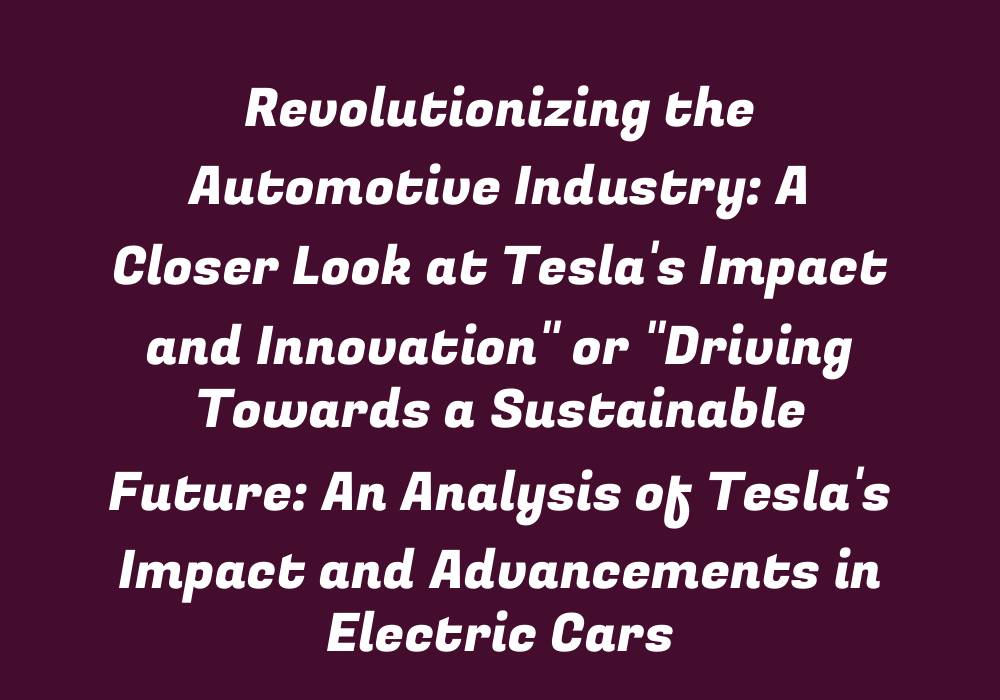Revolutionizing the Automotive Industry: A Closer Look at Tesla’s Impact and Innovation
Introduction to the Tesla Revolution
Tesla, an American automobile manufacturer and energy company founded by Elon Musk in 2003, has made a significant impact on the global transportation industry. From its conception to becoming a multibillion-dollar corporation, Tesla has disrupted conventional vehicle design and manufacturing methods while also promoting sustainable energy usage. In this article, we delve deeper into examining how Tesla’s innovations have revolutionized the automotive sector and contributed to a brighter, more environmentally conscious future.
Electric Vehicles: The New Normal
The most prominent aspect of Tesla’s contribution to the industry is its dedication to electric vehicles (EVs). EVs have numerous advantages compared to their gasoline-powered counterparts, such as lower maintenance costs and improved fuel efficiency. By introducing Tesla models like the Model S, X, and Y, they have popularized electric cars in the mainstream market. These vehicles have become synonymous with luxury and high performance, setting a precedent for future EV designs from other manufacturers.
Tesla’s impact has gone beyond just producing a few electric car models. The company has also pioneered groundbreaking battery technology that enables long-range driving and rapid charging capabilities. With Tesla Supercharger stations across the United States, Europe, China, and Australia, drivers can now travel long distances while conveniently refueling their vehicles in minutes instead of hours.
Sustainability at its Core: Embracing Clean Energy
Apart from electric cars, Tesla also ventures into solar energy generation through its subsidiary, SolarCity. Through Solar Roof tiles and Powerwall products, the company provides homeowners with clean, sustainable energy solutions. This integration of transportation and energy sources further demonstrates Tesla’s commitment to creating a comprehensive ecosystem aimed at reducing carbon emissions and dependence on fossil fuels.
Autonomous Driving: The Future of Road Safety
Perhaps the most revolutionary aspect of Tesla vehicles is their focus on autonomous driving technology, commonly referred to as Autopilot. This system combines cameras, ultrasonic sensors, and radar to facilitate semi-autonomous driving capabilities like adaptive cruise control and automatic lane changes. Tesla’s investment in this area has spurred numerous other car manufacturers to explore similar autonomous systems, ultimately pushing the automotive industry towards safer, more efficient transportation solutions.
Embracing Innovation: A Paradigm Shift
Tesla’s impact on the automotive industry extends beyond its vehicles and energy initiatives. The company has challenged traditional manufacturing methods through its innovative design processes. For instance, Tesla’s commitment to online direct sales and minimal dealer networks enables the brand to minimize costs while focusing more on customer experience and product development.
Additionally, Tesla’s open-source approach to sharing vehicle information with other car manufacturers encourages collaboration and fosters innovation across the entire sector. This newfound spirit of cooperation among competitors has led to a significant shift in industry attitudes and practices, ultimately benefiting consumers as well.
Conclusion: Driving Towards a Sustainable Future
Tesla’s influence on the automotive industry goes beyond simply producing electric vehicles and solar energy solutions. By challenging traditional vehicle design concepts and embracing innovation, Tesla has sparked a revolution in the way cars are manufactured and marketed. The company’s focus on clean energy and sustainable transport is inspiring other car manufacturers to prioritize similar values in their products and practices, ultimately driving us towards a greener future for generations to come.
